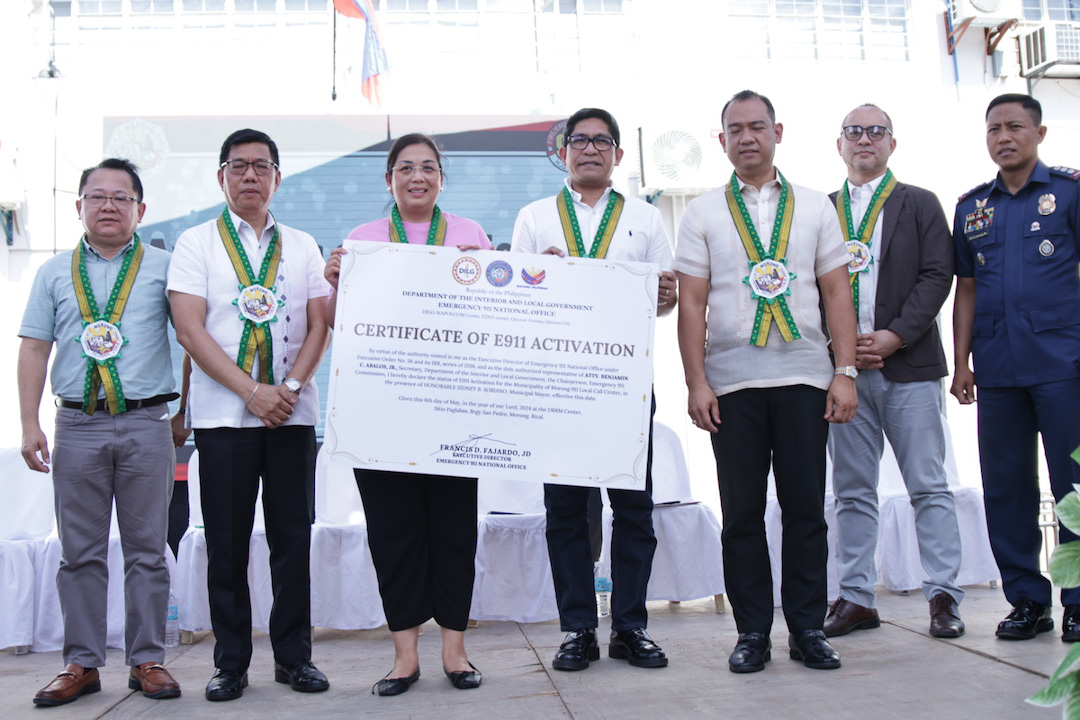NEWS
Morong, Rizal becomes 1st LGU with next-generation Advanced 911 emergency response and public safety system

9:24 p.m. May 7, 2024
Second class municipality Morong in Rizal Province is now the very first local government unit in the Philippines with a first-class, next generation emergency response and public safety system to respond to emergency calls and ensure the protection of its residents.
Morong Mayor Sidney Soriano, Vice Mayor Jose Fred Feliciano and other key municipal officials signed an agreement with NGA Philippines (NGA) the local subsidiary of multinational corporation NGA 911, LLC headquartered in California, USA in April last year to provide Morong with world-class and complete solutions for emergency communication and public safety services.
NGA is known globally as the innovator of emergency calling technology, and the leader in Next Generation 911 (NG911) emergency communications worldwide. The NGA NG911 system is built on the industry standards adopted by the National Emergency Number Association (NENA) in the United States and the European Emergency Number Association (EENA).
Monday, May 6, Morong local officials led by Mayor Sidney Soriano and NGA Philippines Country Head Robert Llaguno led the Go Live activation of the Morong Disaster, Risk Reduction and Management (DRRM) Command Center in Sitio Paglabas, Barangay San Pedro in Morong. Present at the Go Live event were Department of Interior and Local Governments Undersecretary Juan Victor Llamas, Rizal Congressman Emigdio P. Tanjuatco III, Rizal Provincial Governor Nina Ricci Ynares and Emergency 911 National Office Executive Director Francis Fajardo.
Now the local government of Morong is ready to respond accurately and efficiently to disasters, accidents, medical emergencies and other distress calls, using the NGA NG911 state of the art digital technology that can save lives and property in the fastest possible time.
“I welcome you all to the inauguration of the Morong, Rizal Emergency 911 Command Center with Next Generation Advanced technology — the very first in the Province of Rizal, the first in the country and in Asia. It has always been our utmost desire to be able to respond to emergencies and crisis situations, effectively and efficiently so that we can provide good public service to the people. Today is the culmination of that dream,” Mayor Soriano said.
NGA Philippines Country Head Robert Llaguno said Morong’s investment in the emergency NGA911 system presently used in the United States pioneers the use of technology in the country that will revolutionize the way and speed with which the LGU can handle emergencies.
“All 911 calls to the Morong DRRM Command Center are now fully recorded and conference and transfer facilities are now seamless,” explained Llaguno. “There is more efficient dispatch and coordination, because IoT capabilities enhance situational awareness that include CCTV streams, GPS location and other early warning devices that can now be integrated to the system.”
Llaguno said the activation of 911 as Morong’s emergency number is aligned with Executive Order 56 of 2018 that institutionalized 911 as the emergency hotline and nationwide emergency answering point replacing Patrol 117.
“It will not only give Morong, Rizal a shorter 911 dialing code compared to the usual 10-digit cell number of responders. By utilizing the NGA NG911 system, the LGU will also be able to pinpoint with high accuracy the location of the emergency call and associate the same with the closest responders to provide a more immediate response.”
Personnel of the Next Generation Call Handling System of Morong will be trained by NGA and the Emergency 911 National Office. Specialized telephone equipment provided by NGA will be used by dispatchers to answer 911 calls and text messages, with the call handling equipment plotting the 911 call or text on a map and pinpointing the location of the caller or emergency. The command center runs 24/7.
The technology, used in the United States, has changed the face of emergency communications by using internet protocol (IP) technology to transmit voice, text and video messages between callers and emergency responders. It can provide real-time data on the location and condition of callers, which can help first responders make more informed decisions in emergency situations.
Other LGUs in the country have been briefed on the capabilities of the technology with some already set to follow Morong’s lead.
NEWS
TikTok enhances safety, transparency for Filipino community with new initiatives

7:01 p.m. July 16, 2023
TikTok, the world’s leading short-form video platform, is taking further steps to ensure a safer and more transparent platform for its Filipino community. In response to the evolving digital landscape and the rise of AI-generated content (AIGC), these initiatives are designed to maintain a secure environment, uphold community guidelines, and ensure users can trust the content they encounter on the platform.
Strengthening Community Guidelines Enforcement
As part of its ongoing efforts to safeguard its community, TikTok recently published its Q1 2024 Community Guidelines Enforcement Report. During this period from January 1 to March 31, 2024, TikTok removed 4.26 million videos in the Philippines for violations of its Community Guidelines. Of these, 99.7% were removed proactively, and 95% were taken down within 24 hours.
To further enhance transparency, TikTok updated its Community Guidelines in April to provide clearer rules and introduce new features that help creators understand and comply with policies. Available in English and Filipino, these guidelines include detailed definitions and outline moderation practices for features like Search, LIVE, and the For You feed, ensuring policies are clear and accessible to all users.
Advancing AI-Generated Content Transparency
In response to the increasing prevalence of AI-generated content, TikTok has implemented new measures for transparency. Since May, TikTok has automatically labeled AI-generated content uploaded from specific platforms. This initiative is part of a collaboration with MediaWise, a program of the Poynter Institute, and the Coalition for Content Provenance and Authenticity (C2PA), making TikTok the first video-sharing platform to adopt C2PA’s Content Credentials technology. These labels aim to provide users with clear context about the nature of the content they consume.
Educating the Community with Media Literacy Tools
To support its community in navigating AI-generated content and combating misinformation, TikTok is launching new media literacy resources. Developed in collaboration with experts, these resources are integral to TikTok’s broader strategy to enhance user understanding and foster a more informed community. As part of this initiative, TikTok has partnered with MediaWise to release 12 educational videos throughout the year. These videos aim to teach universal media literacy skills and explain how TikTok’s AI-generated content labels can help contextualize content. This partnership underscores TikTok’s commitment to educating its community and fostering a more informed user base.
Expanding AIGC Labeling Through Partnerships
Building on its efforts to ensure content transparency, TikTok has extended its auto-labeling capabilities for AI-generated content created on other platforms. By integrating the ability to read Content Credentials from C2PA, TikTok automatically recognizes and labels AI-generated content, with plans to expand this to audio-only content soon.
In the coming months, TikTok plans to attach Content Credentials to its content, ensuring transparency even when content is downloaded, allowing users to utilize C2PA’s Verify tool to identify AI-generated content and understand its creation details.
Driving Industry-Wide Adoption
In its mission to promote industry-wide adoption of Content Credentials, TikTok has joined the Adobe-led Content Authenticity Initiative (CAI). As the first video-sharing platform to implement Content Credentials, TikTok is at the forefront of encouraging transparent content practices across the industry. The gradual increase in auto-labeled AI-generated content on TikTok is expected to grow as more platforms adopt this technology, fostering a more transparent digital landscape.
For You Feed and Creator Code of Conduct
To further enhance safety, TikTok has introduced new standards that will temporarily restrict accounts that repeatedly violate content standards. These accounts and their content will be harder to find in search, with creators being notified and given the option to appeal.
Additionally, TikTok published a Creator Code of Conduct outlining the standards expected from creators involved in TikTok programs, features, events, and campaigns. This code reinforces TikTok’s commitment to maintaining a safe and inclusive platform.
Through these measures, TikTok continues to focus on helping its community, especially creators, understand its rules and enforcement methods to ensure a safer experience for its users. By embracing continuous innovation and collaboration, TikTok strives to create a secure and inclusive space for creativity and connection.
NEWS
SM Prime, DTI empower MSMEs with 83 SM mall spaces, training, mentorship


9:15 p.m. July 12, 2024
Good news for Micro-, Small, and Medium-Sized Enterprises (MSMEs)! SM Prime Holdings (SM Prime) and the Department of Trade and Industry (DTI) solidified a partnership through a Memorandum of Agreement (MOA) signing ceremony held on July 1 at the SM Prime Headquarters.
This collaboration empowers MSMEs with prime mall space in 83 SM Malls nationwide, aligning with the One Town, One Product (OTOP) Philippines program. Besides providing space, SM Prime offers MSMEs discounted booth rentals, training programs on product development, marketing, financial management, and mentorship opportunities with experienced business leaders.



NEWS
DTI National Food Fair celebrates local flavors at SM Megamall

8:26 p.m. July 11, 2024
The Department of Trade and Industry (DTI) successfully concluded the 10th National Food Fair at SM Megamall’s Megatrade Halls 1-3, held from July 3-7, 2024. This premier event showcased the rich flavors of the Philippines and empowered over 200 Micro-, Small, and Medium-Sized Enterprises (MSMEs).
Food enthusiasts enjoyed a bounty of fresh produce, regional specialties, and delectable treats from all corners of the country. Attendees had the opportunity to stock up on pantry staples, explore health-conscious options, and discover unique ingredients to elevate their cooking skills.
(L-R): Megatrade Hall’s Maite Quiogue, SM Supermalls’ Assistant Vice President for Operations Royston Cabunag, Department of Trade and Industry (DTI) Undersecretary for Micro-, Small, and Medium-Sized Enterprises (MSME) Development Group Cristina Roque, Guest of Honor Winnie Chua-Go, SM Megamall Assistant Vice President for Operations Christian Mathay, SM Supermalls’ Vice President for Corporate Marketing Grace Magno, DTI-Bureau of Market Development, Promotions, and One Town, One Product (OTOP) Philippines Director Marievic Bonoan, and SM Megamall Assistant Mall Manager Isabella Manjon
(L-R): Department of Trade and Industry (DTI) Undersecretary for Micro-, Small, and Medium-Sized Enterprises (MSME) Development Group Cristina Roque, Guest of Honor Winnie Chua-Go, and DTI-Bureau of Market Development, Promotions, and One Town, One Product (OTOP) Philippines Director Marievic Bonoan
The 2024 Department of Trade and Industry (DTI) Bagong Pilipinas National Food Fair brings together the best food and flavors from all 16 regions.
Fresh pomelos and other local fruits take center stage at the National Food Fair in Megatrade Hall.
A potential buyer gets ready to take home bottled Bicol Express and Laing at the 10th National Food Fair in SM Megamall.
Crispy, salty, and packed with nutrients —these water spinach chips are the perfect healthy snack.
Bottled honey and baked fruit crisps, all made with local ingredients.
Davao del Sur and Misamis Oriental’s chocolate products are crafted from premium cacao beans.
Quality golden salted eggs from Rizal.
A variety of coconut products from San Pablo, Laguna.

















